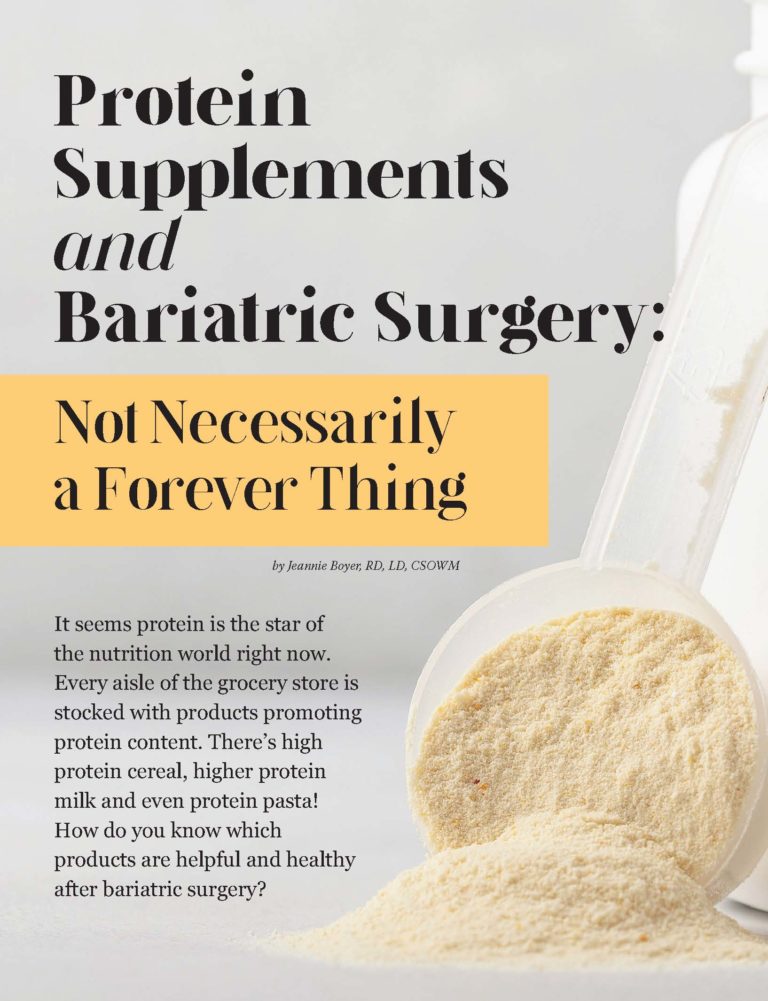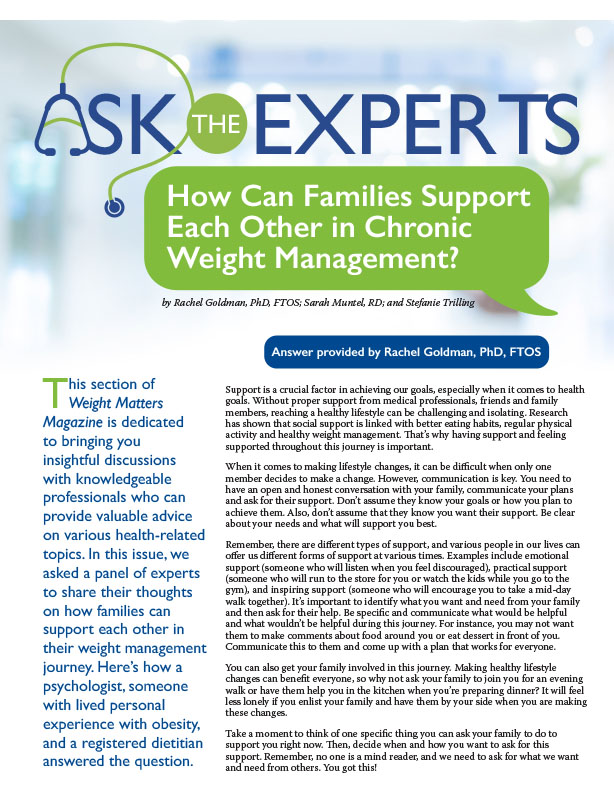Protein Supplements and Bariatric Surgery: Not Necessarily a Forever Thing


by Jeannie Boyer, RD, LD, CSOWM
Spring 2022
It seems protein is the star of the nutrition world right now. Every aisle of the grocery store is stocked with products promoting protein content. There’s high protein cereal, higher protein milk and even protein pasta! How do you know which products are helpful and healthy after bariatric surgery?
What Do I Need to Know about Protein?
Before we get into the details, let’s first get to know protein a little better. Many think only of muscles and meat when considering protein, but protein is a macronutrient that’s responsible for many functions in our bodies. Protein breaks down into different amino acids that are then used to build tissue, repair injury, send hormone signals, function as enzymes and maintain normal pH levels in your blood. As you can see, protein is important.
In the first months after bariatric surgery, the emphasis of the post-surgery diet is on protein. During times of rapid weight-loss and limited calorie intake, the body breaks down lean body mass (muscle) into free amino acids so that tissue repair, enzyme reactions and hormone function can continue. To limit the loss of lean body mass, we must ensure we’re getting adequate and quality protein.
A common recommendation for protein intake after a gastric bypass and gastric sleeve is 60-80 grams per day. Up to 100 grams per day is recommended after a duodenal switch or SADI-S procedure. This is not an extremely high amount of protein but can be hard to consume after bariatric surgery. Three ounces of chicken (the size of a deck of cards) provides 21 grams of protein, but it can take up to three months and often longer for a post-op patient to be able to consume that much solid food at one meal. When total intake volume is so limited after bariatric surgery, we rely on protein supplements.
So, What Do You Choose?
Shopping for protein supplements can be overwhelming. Some of the common questions you may ask yourself are:
- Should I choose whey, vegan or collagen?
- Powder or liquid?
- Can I use the one my neighbor offered to give me?
- Is it okay to just buy something at the grocery store?
- Should I go to the more expensive nutrition store down the street?
It can make your head spin! Let’s answer each of these questions below:
Should I choose whey, vegan or collagen?
As explained briefly earlier, our bodies use amino acids to build the proteins we need. This could be an enzyme to cause a reaction in our metabolism, collagen to protect our skin or muscle growth. There are nine amino acids our body cannot make. These are called essential (or indispensable) amino acids and we must obtain them from our diet. In the early weeks and months after surgery, this means getting them from a supplement. The most important thing about a protein supplement is to make sure it provides all essential amino acids.
How Do I Know My Protein Supplements are Providing Me with the Essential Amino Acids?
Well, you could memorize the nine essential amino acids and read the label of every product you’re considering, or you could check the Protein Digestibility-corrected Amino Acid Score or the Digestible Indispensable Amino Acid Score (PDCAAS or DIAAS). These scores are used to measure the bioavailability or absorption of the amino acids in a product. For either of these scores, the higher the number, the better.
The PDCAAS is the older system and is based on a 1.0 or 100% scoring system. If a product is anything less than 1.0, it is not considered a good quality product. The DIAAS is considered a newer and more accurate way to measure. It scores foods on a scale of not quality (75%), good quality (75-99%), or excellent quality (100% or more).
Products made with whey, casein or egg whites have a higher PDCAAS and DIAAS than pea, rice or collagen-based products. Just after bariatric surgery, it is best to choose a whey, egg or casein-based supplement to ensure you are getting all essential amino acids and adequate protein. As time goes by after surgery and you can eat an increased variety of protein foods and tolerate larger volumes; you could incorporate other protein supplements with lower scores without risking your necessary amino acid intake.
Powder or Liquid?
Either. Powder protein supplements have more flexibility because you can mix them into a variety of zero-calorie or very-low-calorie beverages or add them to sugar-free pudding and light yogurts. For instance, you can mix orange Crystal Light with vanilla whey protein powder for a ‘creamsicle’ shake or mix chocolate whey powder with light cherry-flavored yogurt for a chocolate-covered cherry treat.
Ready-to-drink products are super convenient. They are easy for travel and work. You can often find good-quality products in gas stations that are simple to carry with you. You don’t have to worry about clumpy powder or having your shaker bottle clean and ready at all times.
Can I Use the One Someone Else Gives Me?
If someone else has not had bariatric surgery, their protein supplement may not have enough protein for you and may not be as high of quality. You will probably want to stay clear of it. It’s best to follow the suggested product list provided by your surgery clinic or reach out to a dietitian to ensure you are getting what your body needs after surgery.
Can I Get One at the Grocery Store?
Likely, yes! There are more and more high-quality protein drinks available in grocery stores every year. You can even order popular products from Amazon, Costco or Sam’s and have them delivered to your doorstep.
Long-Term Use of Protein Supplements
As time goes by, after a gastric bypass or gastric sleeve, the need for protein supplements decreases. The goal for each patient is to be able to eat real food protein sources at regular intervals to meet protein goals. If you are unable to meet your protein goals from your diet, you may continue to use protein supplements, but you likely will not require the common ready-to-drink 30g protein products.
Protein Supplements Are Important but Not Forever!
In conclusion, protein supplements are a very important but temporary part of your bariatric journey. When most of your protein intake is from supplements, be sure to choose products made with whey, egg white or casein. Once you are able to eat a variety of foods and textures, it’s best to evaluate your intake to determine if you actually need a supplement.
About the Author:
Jeannie Boyer, RD, LD, CSOWM, has been a bariatric dietitian for nearly 20 years and has worked in East Tennessee, Northern California and now Charleston, South Carolina. She is a regular contributor on the new Barination.com and loves making motivational, comical and educational reels on her Instagram account @barisuccessrd.
by Rachel Goldman, PhD, FTOS; Sarah Muntel, RD; and Stefanie Trilling Winter 2024 This section of Weight…
Read Articleby OAC Staff Members Kendall Griffey and Michelle “Shelly” Vicari Winter 2024 In a world that often…
Read Articleby Kelli Richardson, RD You’ve probably heard the generic advice before: Eat your fruits and veggies. Limit…
Read Article








